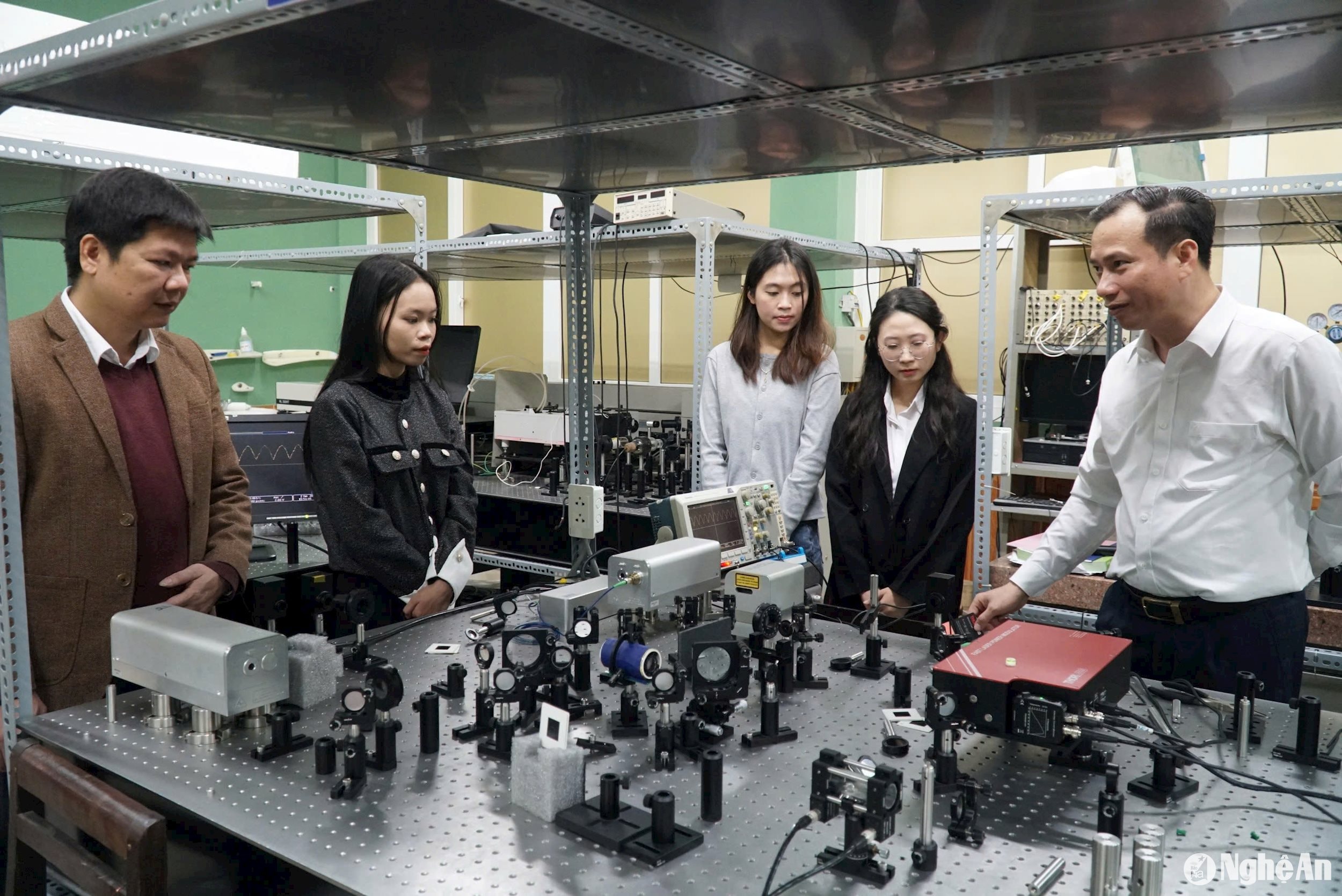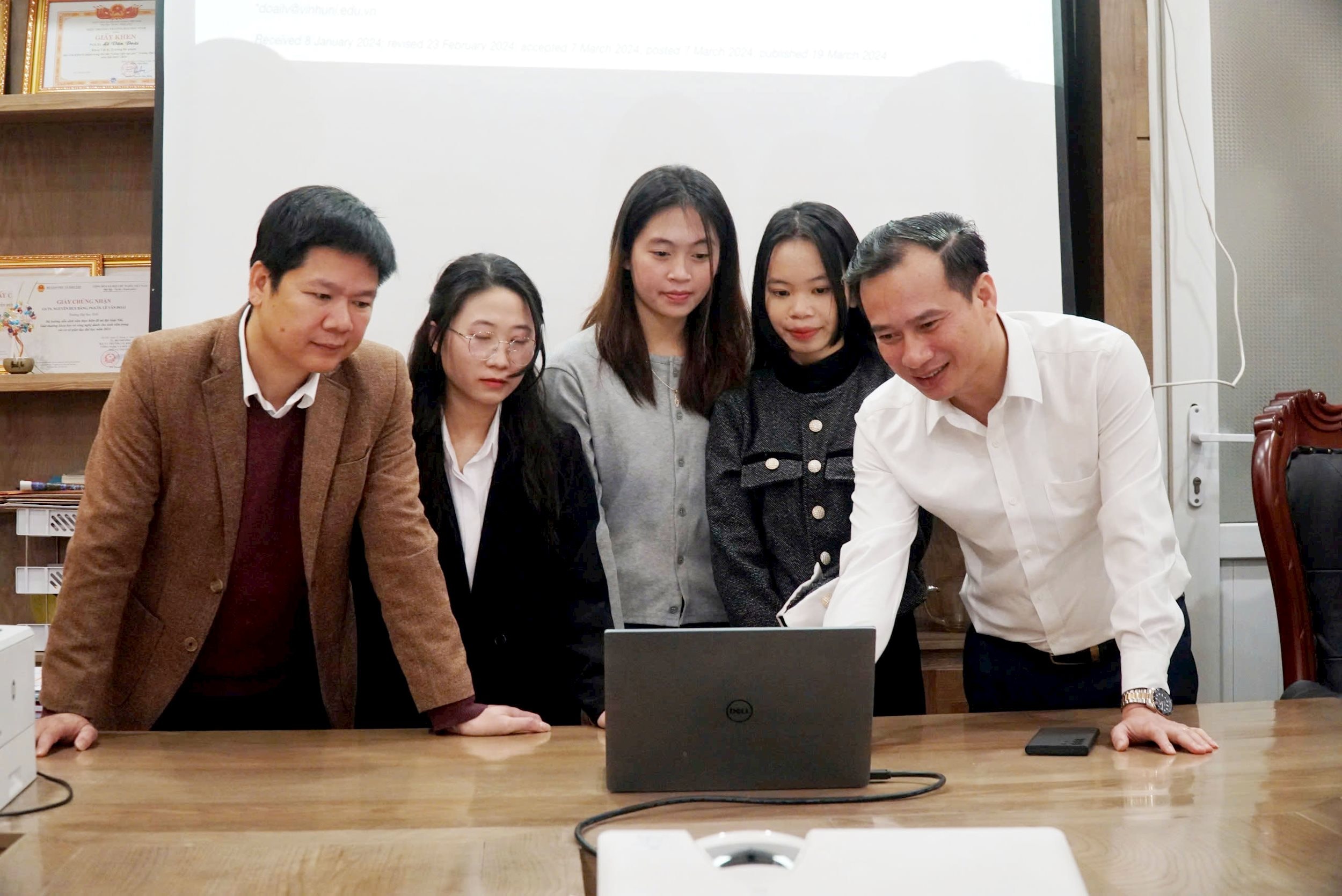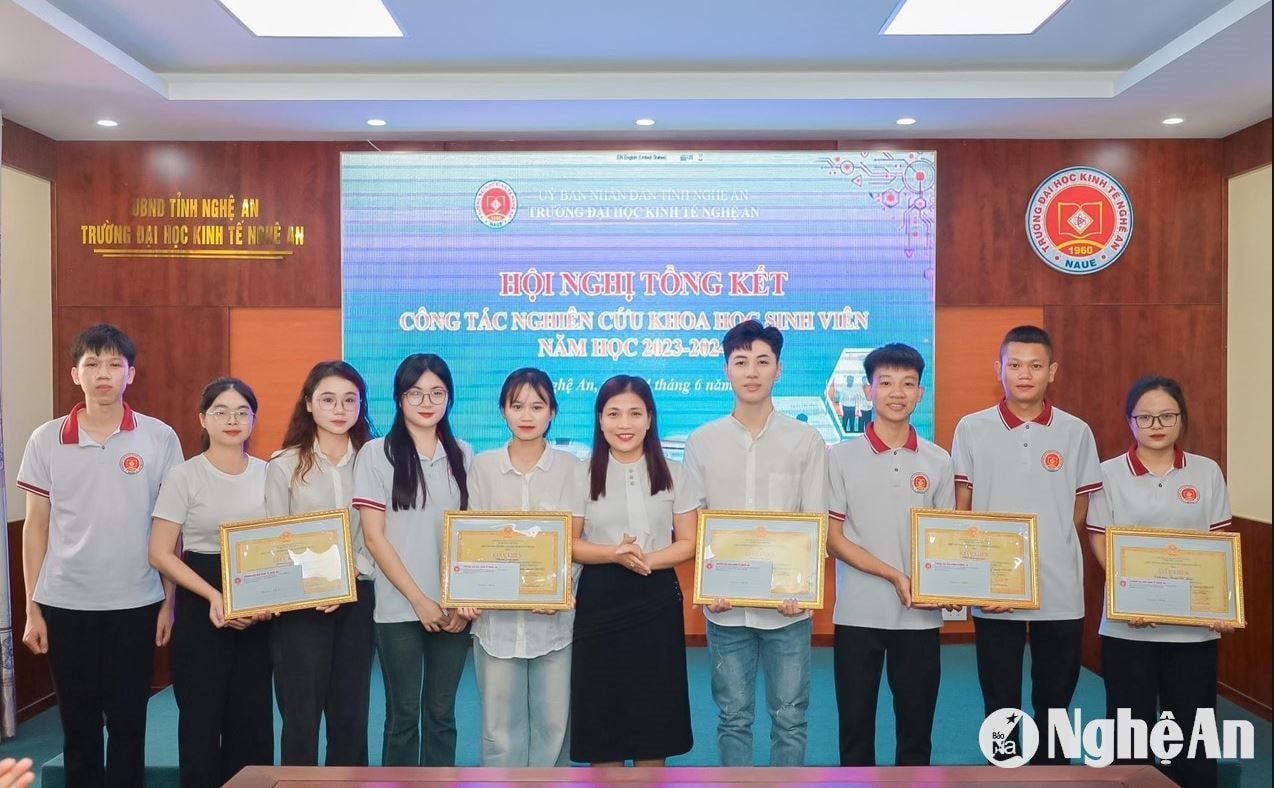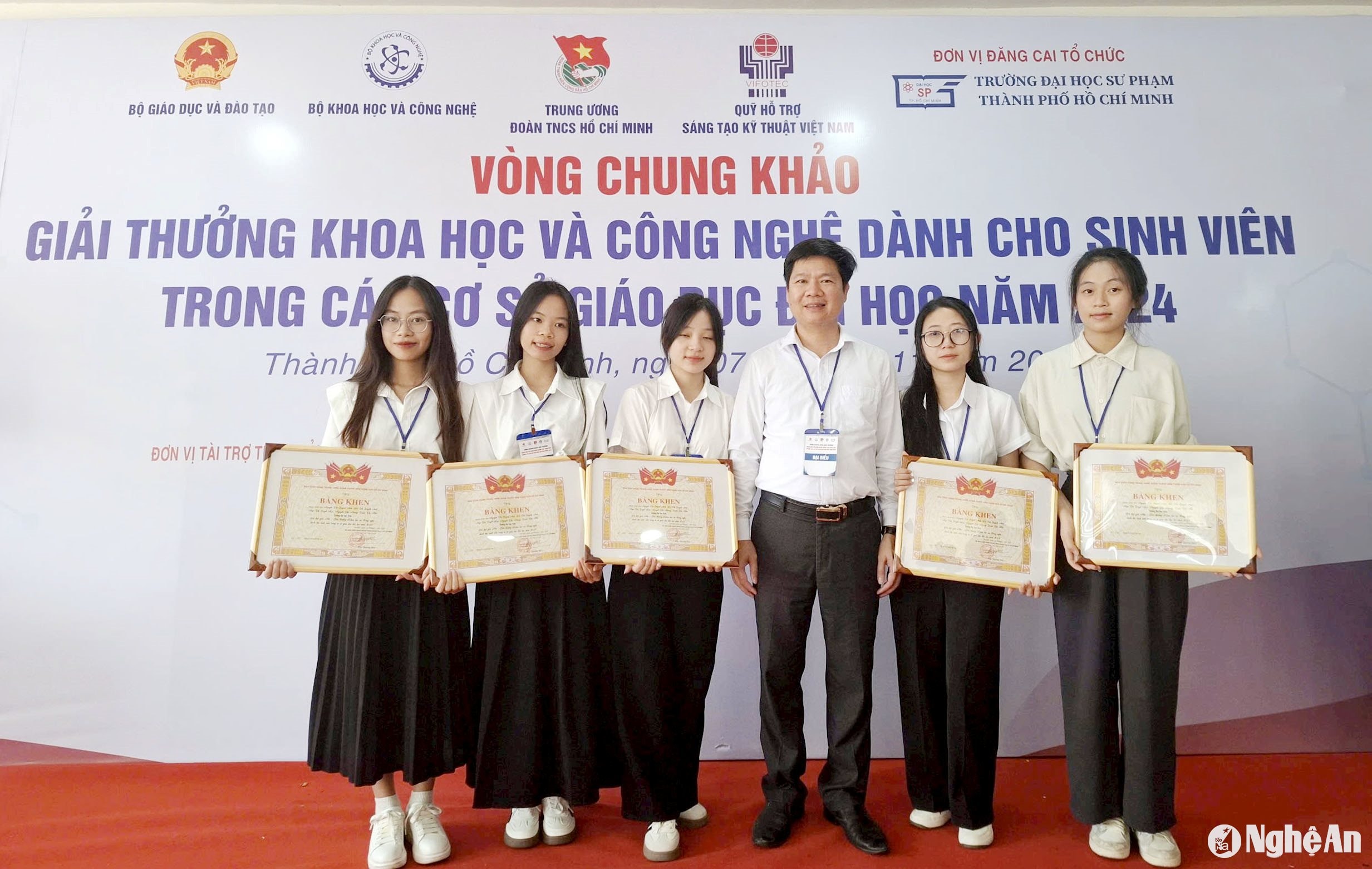Provide opportunities for students to develop their abilities in scientific research
Scientific research activities are considered the foundation for improving the quality of training at universities. The projects implemented help students actively apply theory in the classroom to practice and practice many important skills, "paving the way" for the future.
Accompanying students
Until now, Nguyen Thi Quynh Anh and students Ha Thi Quynh Anh, Ngo Thi Tuyet Mai, Nguyen Thi Nhung, Trinh Thi Nhu - Class 62A Physics Pedagogy - Pedagogical School - Vinh University still have not forgotten the feeling of happiness when receiving information about the article about the project "Research on electromagnetic induction grating of 85Rb atomic environment with five energy levels" was published in the prestigious journal of the American Optical Society.
What makes Ngoc Anh and the students happier is that although the project was directly guided by Professor Nguyen Huy Bang - PrincipalVinh Universityand Associate Professor Dr. Le Van Doai - lecturer of the Faculty of Physics Education, but when publishing the article, the school's lecturers respectfully listed the students' names before the instructors' names.
The lecturer is an experienced person so he only guides the research direction, the rest of you participate in calculating, experimenting, and writing reports. Therefore, based on the contribution as well as respecting the intelligence and ability of the students, the author section, the student's name is at the top of the scientific article, not the lecturer's.
Associate Professor, Dr. Le Van Doai - Dai Vinh University
In November 2024, this project was also awarded the Second Prize in the Science and Technology Award for students in higher education institutions in 2024 by the Ministry of Education and Training - Ministry of Science and Technology, the Central Committee of the Ho Chi Minh Communist Youth Union and the Vietnam Fund for Supporting Technical Innovation - VIFOTEC.

The topic “Research on electromagnetic induction grating of 85Rb atomic medium with five energy levels” is the first research topic in Vietnam. This research can create breakthrough applications for multi-channel photonic devices with low threshold intensity and ultra-high sensitivity.
At the same time, the theoretical study of such electromagnetic induction gratings is of great significance for experimental observation and application orientation.
Experimentally, the spectroscopy research group of Vinh University has also successfully built an experimental system to observe the quantum interference effect of the Rb atomic gas environment.
In particular, based on the quantum interference effect, the research team measured the giant group refractive index and observed super slow light signals of several hundred meters per second (normally light propagates at a speed of 3.108m/s).
The research results have been published in prestigious journals of the American Optical Society (Journal of the Optical Society of America B 41, No. 4, 976, 2024 and Optics Letters 49, No. 17 (2024) 4787).

Coming to this award, Nguyen Thi Quynh Anh is also the representative of the group of authors, taking on the task of presenting the topic to the judges. Participating in the project has also helped Quynh Anh grow and progress, helping her develop many basic skills and discover herself.
Previously, Quynh Anh was a student at Nghi Loc 5 High School and was the valedictorian of the Physics Pedagogy major. Despite having a favorable starting point, Quynh Anh admitted that during her high school years she was quite shy and could not develop her abilities. Entering university, participating in scientific research projects early on, Quynh Anh became more and more confident and was highly appreciated by lecturers. Currently, she is one of the few students who have the opportunity to graduate with excellent grades from the faculty and win a place to study directly as a doctoral student at the university.
Building a creative environment
This school year, Vinh University has 2 projects winning the Second Prize in the Science and Technology Award for students in higher education institutions. This is the most outstanding result in many years that Vinh University has participated in this award.
Previously, from more than 15,000 topics selected from the base, the Organizing Committee selected 106 best topics from 46 higher education institutions. In addition to 2 Second Prizes, Vinh University also had 4 groups of students winning Third Prizes and 4 groups of students winning Encouragement Prizes in many different fields including: Science and Technology, Natural Sciences and Social Sciences, Agricultural Sciences. Also in the past school year, Vinh University had a total of 48 scientific research works by 167 students published in specialized scientific journals (ISI, Scopus Q2 and domestic scientific journals).
.jpg)
According to Prof. Dr. Nguyen Huy Bang - Rector, for many years now, Vinh University has put forward a strategy for developing science and technology, which plays a key role in improving the quality of training. The school has issued regulations on awarding scientific research projects for students, and every year, student groups proactively carry out research under the guidance of lecturers and scientists inside and outside the school.
In addition to creating conditions in terms of time, facilities, and laboratories, the school has also issued regulations to increase the reward and support level for scientific research students by at least twice compared to the payment level according to the old regulations. In the past 2 years, the total budget for scientific research activities of students is more than 500 million VND.

InNghe An University of Economics(now Nghe An University), Dr. Do Ngoc Dai - Head of Training Management - Science and International Cooperation Department affirmed: Scientific research is an activity that plays an important role in the training process.
Scientific research work partly improves the quality of training as well as orients the approach to practical needs, enhances students' adaptability to the job market, especially in professions that require students to be proactive and creative before graduation to meet the expectations of employers.
Dr. Do Ngoc Dai - Nghe An University
As one of the few students of the school who have just been awarded the title of "5 Good Students" in 2024 by the Provincial Youth Union and Provincial Student Association, Tran Thi Thuy Linh - a student of the Faculty of Economics - Business Administration of the school said that participating in scientific research activities and startup awards is an important "stepping stone" for her to achieve excellent academic results.
Linh started doing scientific research in her first year and thanks to that, she developed skills from analytical thinking, problem solving to improving professional knowledge and expanding her network of relationships. Besides, this activity also helped her practice teamwork, writing and presentation skills, as well as creativity and adaptability to the modern working environment.
To encourage students to participate in scientific research, Nghe An University also organizes student conferences with scientific research work. This is a forum for students of the whole school to exchange scientific information, a way for students to practice their ability to present in front of crowds, before conferences.
This is an extremely necessary and useful activity for students in terms of both professional knowledge and report presentation methods, training research capacity and ability to present research results. In addition, the school must invest in facilities, laboratory equipment, motivate and assign instructors so that all students have the capacity to participate in research topics.

With the support of the school and lecturers, there are now many scientific research playgrounds for students to compete. From these competitions, many products and solutions proposed by students are highly appreciated for their innovation and creativity and continue to be invested in to put the project into practical application.


